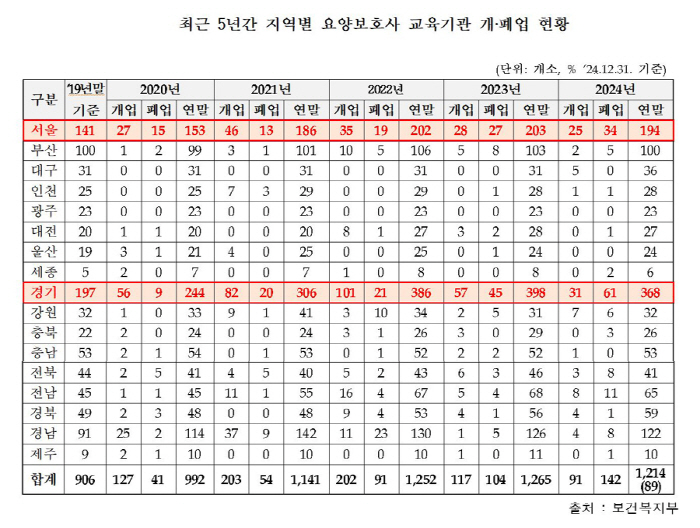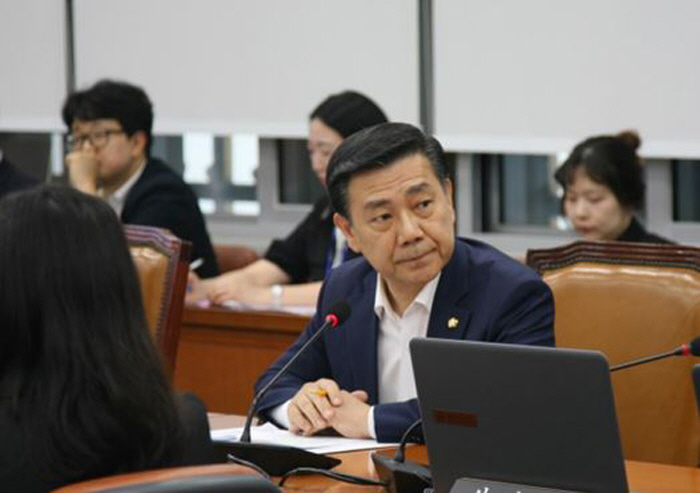Over the past five years, the closure of nursing care workers' educational institutions has more than tripled
Apr 01, 2025
|
In addition, three foreigners have applied for the visa status of a 'foreign care worker' newly established by the Ministry of Justice to resolve the shortage of care workers.
This is based on data submitted by Baek Jong-heon (Geumjeong-gu, Busan), a member of the National Assembly's Health and Welfare Committee, from the Ministry of Health and Welfare and the Ministry of Justice.
According to the data submitted by the Ministry of Health and Welfare, the number of nursing care workers has been steadily increasing nationwide over the past five years, with a total of 674,791, including 101,655 in facilities and 573,136 in-home care workers.
By gender, women accounted for 93.5%, overwhelming, and men accounted for only 6.5%.
According to data from the National Testing Service for health care workers, the average age of qualified nursing care workers was 58.5 years for men and 53.9 years for women, with an average age of 54.5 years.
According to the status of the opening and closing of education institutions for nursing care workers by region over the past five years, the number of education institutions for nursing care workers that have closed has more than tripled from 41 in 2020 to 142 in 2024. In detail, the number of business closures in Gyeonggi Province increased more than six times from nine to 61 during the same period, while Seoul more than doubled from 15 to 34.
However, the number of newly opened educational institutions increased during the same period, increasing the total number of educational institutions by 89%.
In response, the Ministry of Health and Welfare stated, "The number of educational institutions that increased significantly during the COVID-19 pandemic seems to have decreased due to a sharp drop in trainees in 2024."We will carefully examine the training of nursing care workers so that there will be no disruption." he said.
Although the number of nursing care workers and educational institutions is increasing, the number of nursing care workers nationwide as of 2028 was estimated to be about 116,000, according to the Health Insurance Research Institute's 'Plan for Receiving and Securing Care Care Workers'.
By city and province, North Gyeongsang Province is expected to be the most scarce at 18,000 as of 2028, followed by South Jeolla Province (17,000), North Jeolla Province (14,000), and South Chungcheong Province (12,000). In response, the Ministry of Health and Welfare predicted that 2025 will not be insufficient, considering the actual number of workers (671,852) as of 2024 compared to the original supply estimate (650,2902) in 2024, and that the size of the shortage will decrease slightly from the original forecast in the future.
In order to prepare for the shortage of care workers, the Ministry of Justice established a nursing care worker job on a specific activity (E-7) visa with a limit of 400 people per year in July last year, and on the 5th, it announced that it would test run a specialized training course for training foreign nursing care workers with the Ministry of Health and Welfare at the 30th Foreign Policy Committee.
Since the establishment of a specific activity visa, a total of three foreigners have obtained a degree or higher in domestic university specialization, obtained a nursing care worker's license, and issued a specific activity (E-7) visa, and their nationalities are Vietnam, Mongolia, and Mali, with two in their 20s and one in their 30s.
Representative Baek Jong-heon emphasized that "Although the demand for nursing care workers is increasing due to the rapidly aging population at an unprecedented rate, the closure of institutions to educate them is increasing significantly. We will continue to consult with relevant ministries and local governments to help ensure that the nursing care worker system can be implemented faithfully."
|
This article was translated by Naver AI translator.















